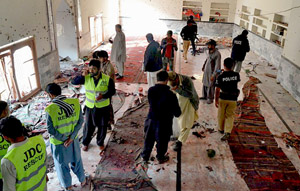Karachi, Jan 30: At least 40people, including children, were killed and over 55 injured when a powerful blast ripped through a packed minority Shia mosque in Pakistan's Sindh province during the Friday prayers, in the deadliest sectarian attack to hit the country in recent times.
The roof of a central Shia Muslim Imambargah came down after an explosion in Lakhi Dar area of Shikarpur - around 470 kilometres north of here - when worshippers had assembled for the Friday prayers, burying them.
At least 40 people were killed and over 55 were injured in the attack, some critically. Private media said it could be suicide bombing.
Many were trapped under the debris and hundreds of people rushed to the scene to dig out survivors.
The explosion was heard several kilometers away. Children are also said to be among the victims. Television footage showed chaotic scenes as people rushed to take the wounded for treatment using cars, motorbikes and rickshaws.
"It was a big explosion inside the Imambargah and was set off with a remote device. The intensity of the blast led to the roof of the make-shift building caving in completely which has led to many deaths," senior police official Abdullah Mehr said over telephone.
Geo TV quoted DIG Shikarpur Rakhio Mirani as saying that a man brought a device inside the Imambargah and used it to detonate a bomb.
The blast is the latest in a rising tide of sectarian violence blighting Pakistan, where radical Sunni Muslim groups often target Shia Muslims, who form about one-fifth of the 180 million-population.
Jundullah militant group took responsibility of the attack. "Our target was the Shia because they are our enemies," spokesman Fahad Marwat said.
The group last year parted ways with the Taliban and announced allegiance with the Islamic State militant group.





Comments
Add new comment